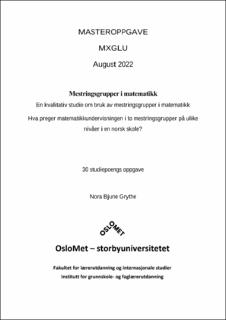| dc.description.abstract | Tema for denne masteroppgaven er mestringsgrupper i matematikkundervisningen. Fenomenet mestringsgrupper innebærer i denne oppgaven at elever blir tildelt nye grupper i matematikkundervisningen, for å skape mer homogen gruppesammensetning. Flere faktorer kan spille inn på inndelingen, i denne forskningen var det en vektlegging av elevenes faglige nivå. Hensikten med forskningsprosjektet er å belyse problemstillingen:
Hva preger matematikkundervisningen i to mestringsgrupper på ulike nivåer i en norsk skole? Som støtte til problemstillingen stilles det forskningsspørsmålene:
- Hvordan tenker lærere når de setter sammen mestringsgrupper?
- Hvordan fordeles tiden i en undervisningstime i matematikk ved bruk av mestringsgrupper?
- Hva slags ressurser har læreren som underviser i en mestringsgruppe?
Dette er en kvalitativ studie. Utvalget mitt består av to lærere og hver deres mestringsgruppe på en norsk skole. Datamaterialet er samlet inn ved to intervjuer og fire observasjoner, to i hver mestringsgruppe. Det ble brukt en semistrukturert intervjuguide til intervjuet. Observasjonen var ustrukturert, åpen, og passiv. Datamaterialet ble analysert med en induktiv kategoridannelse. Noen funn i denne masteroppgaven er:
- Standardiserte tester er med på å påvirke hvilken mestringsgruppe elevene plasseres i.
- Mestringsgruppene inneholder ulike grader av elevdeltakelse, normer og bruk av det matematiske språket.
- Det er vektlegging av motivasjon, og mye tid uten matematikk i mestringsgruppen på det laveste mestringsnivået
- Mye matematisk kommunikasjon og tydelig struktur preger mestringsgruppen på det høyeste mestringsnivået.
The topic of this master's thesis is ability groups in mathematics teaching. The phenomenon of ability groups means in this assignment that students are assigned to new groups in mathematics teaching, in order to create a more homogeneous group composition. Several factors can play a role in the division, in this research there was an emphasis on the students' academic level. The purpose of the research project is to shed light on the issue:
What characterizes mathematics teaching in two ability groups at different levels in a Norwegian school? As support for the problem, the following research questions are asked:
- How do teachers think when putting together ability groups?
- How is the time distributed in a mathematics lesson using ability groups?
- What kind of resources does the teacher who teaches an ability group have?
This is a qualitative study. My selection consists of two teachers and each of their ability groups at a Norwegian school. The data was collected through two interviews and four observations, two in each ability group. A semi-structured interview guide was used for the interview. The observations were unstructured, open and passive. The data material were analyzed with an inductive category formation. Some findings in this master's thesis are:
- Standardized tests help to influence which ability group students are placed into.
- The ability groups contain different degrees of student participation, norms and use of the mathematical language.
- There is an emphasis on motivation, and a more time without mathematics in the ability group at the lowest level.
- A lot of mathematical communication and a clear structure characterize the ability group at the highest level. | en_US |
